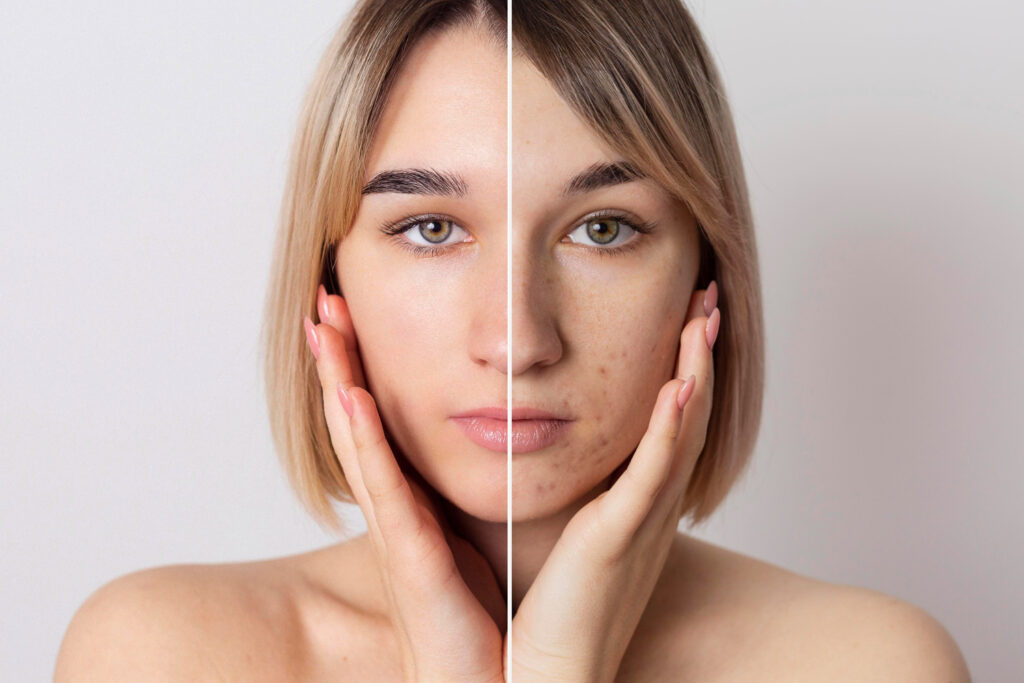Acne can be frustrating, painful, and at times overwhelming. For some, over-the-counter creams and prescription antibiotics help keep breakouts under control. But if you’ve tried these treatments and are still struggling with severe or persistent acne, you may be wondering if there’s something stronger that really works.
That’s where Isotretinoin (often known by the brand name Roaccutane) comes in. It’s a powerful treatment that targets acne at its source and, for many people, it can deliver life-changing, long-term results.
This guide covers everything you need to know about Isotretinoin: what it’s used for, how it works, who can prescribe it, possible side effects, and why proper monitoring is so important.
What is Isotretinoin (Roaccutane)?
Isotretinoin is an oral medication derived from vitamin A. It’s usually recommended when other acne treatments haven’t worked, especially for:
-
Severe or cystic acne
-
Acne that leads to scarring
-
Acne that has a big impact on self-confidence or mental health
Because of its effectiveness, Isotretinoin is often described as the “gold standard” treatment for severe acne. Many people find that after completing one course, their skin stays clear for years or even permanently.
How Does It Work?
Unlike most treatments that only address one aspect of acne, Isotretinoin works on several fronts at the same time, tackling the root causes rather than just the surface symptoms. Here’s how:
-
Reduces oil production – Shrinks sebaceous (oil) glands so they produce much less sebum. Excess sebum clogs pores and feeds bacteria, so reducing oil helps keep pores clearer and less inflamed.
-
Prevents clogged pores – Regulates how skin cells renew themselves, preventing dead cells from sticking together and blocking pores. This helps stop blackheads and whiteheads from forming.
-
Fights acne-causing bacteria – By lowering oil and changing the environment inside pores, Isotretinoin reduces the growth of Cutibacterium acnes.
-
Calms inflammation – Its anti-inflammatory properties reduce redness, swelling, and tenderness.
-
Long-term reset of the skin – Many people find their acne doesn’t return after a course, or only comes back in a much milder form.
Real-life Examples
-
Someone with very oily skin and frequent cystic breakouts often sees a dramatic reduction in painful deep spots.
-
For those who have tried antibiotics and creams without success, Isotretinoin clears bacteria and blocked pores when other treatments fail.
-
Patients with inflamed, red acne that leaves scars benefit from its anti-inflammatory effect, which reduces new scarring.
This combination of benefits—and the potential for long-term remission—makes Isotretinoin one of the most comprehensive acne treatments available today.
Who Can Prescribe It?
Because it’s such a strong treatment, Isotretinoin can’t be bought over the counter. It can only be prescribed by:
-
Consultant Dermatologists
-
GPs with a specialist interest in dermatology
This ensures your treatment is safe, carefully managed, and tailored to your needs.
What to Expect During Treatment
If you and your doctor decide Isotretinoin is right for you, the process usually involves:
-
Initial consultation – Review of your skin, medical history, and previous treatments.
-
Pre-treatment checks – Blood tests for liver function and cholesterol. Women also need a pregnancy test, with reliable contraception required during and shortly after treatment.
-
Personalised dosage – Your dose is calculated based on your weight and skin condition. Most courses last 4–7 months.
-
Regular monitoring – Monthly reviews with blood tests and, if needed, pregnancy tests.
-
Aftercare support – Guidance to help you maintain results after treatment.
Possible Side Effects
Isotretinoin is highly effective, but like any medication, it can cause side effects. Most are mild and temporary, but it’s important to know what to expect.
Common side effects include:
-
Dry lips and skin (almost universal; moisturiser and lip balm are essential)
-
Dry eyes (lubricating drops may help)
-
Nosebleeds (from dryness inside the nose)
-
Increased sensitivity to sunlight (daily SPF is a must)
-
Temporary flare-ups (acne may worsen before improving)
Less common side effects include:
-
Muscle and joint aches
-
Mood changes such as feeling low, irritable, or anxious
-
Changes in liver function or cholesterol (monitored with blood tests)
-
Hair thinning or changes in hair texture
-
Headaches or blurred vision (rare but should be reported immediately)
Most side effects improve or disappear once treatment ends, and with proper monitoring, they can be managed effectively.
Why Monitoring Matters
Because Isotretinoin affects the whole body, regular monitoring is vital to ensure safety. Monitoring usually includes:
-
Blood tests for liver function and cholesterol
-
Pregnancy testing for women before, during, and after treatment
-
Regular reviews with your dermatologist to track progress and adjust dosage if needed
This careful approach is what makes Isotretinoin both safe and effective for most people.
Isotretinoin at Skinspire
At Skinspire, we understand that acne is more than just a skin condition—it can affect your confidence, wellbeing, and daily life. Our mission is to help you achieve clear, healthy skin with safe, expert care every step of the way.
Here’s how we support you on your Isotretinoin journey:
-
Expert prescribing – Managed by GPs with accredited specialist training in dermatology.
-
Thorough consultations – Time taken to understand your skin, health, and personal goals.
-
Safe monitoring – Monthly checkups, blood tests, and pregnancy testing where required.
-
Personal support – Guidance on skincare, managing side effects, and maintaining results.
-
Long-term results – Tailored treatment plans designed for lasting confidence.
With Skinspire, you don’t just get a prescription—you get a supportive team committed to helping you feel confident in your skin again.

